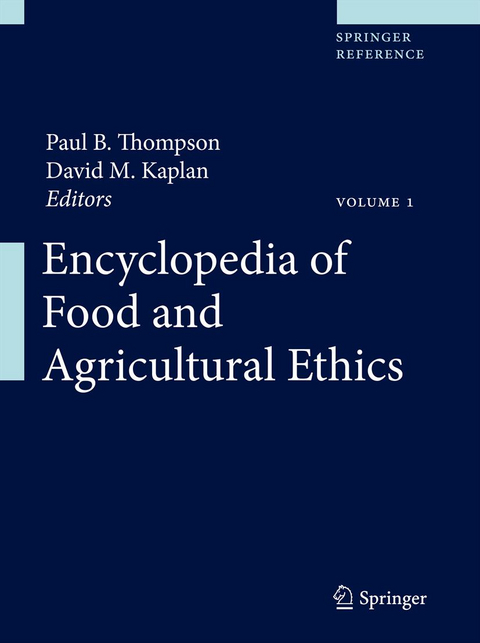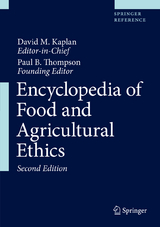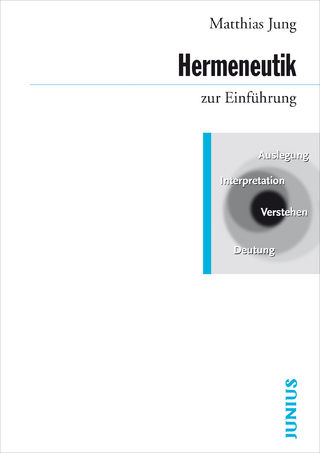
Encyclopedia of Food and Agricultural Ethics
Springer (Verlag)
978-94-007-0928-7 (ISBN)
Renewed debate, discussion and inquiry into food and agricultural topics have become a hallmark of the turn toward more sustainable policies and lifestyles in the 21st century. Attention has turned to the goals and ethical rationale behind production, distribution and consumption of food, as well as to non-food uses of cultivated biomass and the products of animal husbandry. These wide-ranging debates encompass questions in human nutrition, animal rights and the environmental impacts of aquaculture and agricultural production. Each of these and related topics is both technically complex and involves an - often implicit - ethical dimension. This Encyclopedia offers a definitive source on issues pertaining to the full range of topics in the important new area of food and agricultural ethics. It includes summaries of historical approaches, current scholarship, social movements, and new trends from the standpoint of the ethical notions that have shaped them.
It combines detailed analyses of specific topics such as the role of antibiotics in animal production, the Green Revolution, and alternative methods of organic farming, with longer entries that summarize general areas of scholarship and explore ways that they are related. Other topics include methods for integrating ethics into scientific and technical research programs or development projects, the role of intensive agriculture and biotechnology in addressing persistent world hunger and the role of crops, forests and engineered organisms in making a transition to renewable, carbon-neutral sources of energy. The Encyclopedia of Food and Agricultural Ethics will prove an indispensible reference point for future research and writing on topics in agriculture and food ethics for decades to come.
Paul B. Thompson is W.K. Kellogg Chair in Agricultural, Food and Community Ethics, Department of Philosophy, Michigan State University, with partial appointments in the Agricultural Economics and Resource Development Departments. He previously held positions as Distinguished Professor of Philosophy and Director, Center for Food Animal Productivity and Wellbeing at Purdue University and prior to that positions as Professor of Philosophy and Agricultural Economics and Director, Center for Science and Technology Policy and Ethics, at Texas A&M University. Editorial positions at Springer are a jointly held position of editor-in-chief of the bookseries The International Library of Environmental, Agricultural and Food Ethics, and membership of the editorial boards of the journals Agriculture and Human Values, and Journal of Agricultural and Environmental Ethics.
Topics for long articles (7500-10000 words each) are: Agricultural, food and environmental science- organization and focus of applied agrifood science, positivism and influence on course of agriculture, Green Revolution
Agriculture and food technology- as distinct from above, discussion of key technologies including mechanizations, pesticides and biotechnology
Aquaculture and fisheries- all aspects of fishing, including ocean impact, issues in whaling, fish farming
Cooking, food preparation and eating- practice of cooking and eating, home and away, dietary rules, gender, ethnicity and ties to popular culture, eating as families, eating in restaurants, with friends
Farming- to include all aspects of crop production including horiticulture, organization of farm labor
Food and culture- religion and ethnicity as components of diet, food aesthetics, class, conspicuous consumption
Grazing and livestock production- extensive and intensive animal production, including lead discussion on animal welfare
Governance and regulatory policy- food safety, environmental impact and non-state process standards (e.g. sustainability, fair trade)
Hunger and distributive justice- food security, extent and types of hunger, entitlements and food availability
Land use - landscapes, conflicts over CAFOs, farmer access to land, zoning, tax policy relating to agriculture, links to forestry, outdoor recreation & conservation, agrarian reforms
Nutrition, diet and health- principles of nutrition and nutrition policy, obesity, conflicts over healthy diets
Rural development- agriculture vs. other elements in the contemporary development of rural communities
Social movements- local food, organic food, fair trade, regionalism, and resistance movements in non-industrialized countries
The food industry- structure of food industry from farm gate to the plate; industry concentration, industry standards and the impact on food availability, food deserts
Trade- international trade, influences on agricultural development including export crops, protectionism & multifunctionalism.
| Reihe/Serie | Encyclopedia of Food and Agricultural Ethics | 1.10 |
|---|---|
| Mitarbeit |
Stellvertretende Herausgeber: Richard J. Bawden, David M. Kaplan, Kate Millar |
| Zusatzinfo | biography |
| Verlagsort | Dordrecht |
| Sprache | englisch |
| Maße | 193 x 260 mm |
| Gewicht | 4115 g |
| Einbandart | gebunden |
| Themenwelt | Geisteswissenschaften ► Philosophie ► Allgemeines / Lexika |
| Geisteswissenschaften ► Philosophie ► Ethik | |
| Recht / Steuern ► EU / Internationales Recht | |
| Recht / Steuern ► Öffentliches Recht ► Umweltrecht | |
| Weitere Fachgebiete ► Land- / Forstwirtschaft / Fischerei | |
| ISBN-10 | 94-007-0928-5 / 9400709285 |
| ISBN-13 | 978-94-007-0928-7 / 9789400709287 |
| Zustand | Neuware |
| Informationen gemäß Produktsicherheitsverordnung (GPSR) | |
| Haben Sie eine Frage zum Produkt? |
aus dem Bereich



